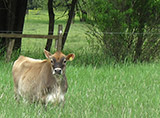The Seattle Times
by Elizabeth Zach
 |
Pam Schreiber, organic farmer
Source: USDA |
According to the USDA, the women who identify themselves as farmers or ranchers run the gamut from those who raise cattle, sheep, poultry, pigs and goats in the West and Midwest to viticulturists who nurture malbec and pinot noir grapes in California, Washington and Oregon.
RUIDOSO, N.M. — Although Laura Jean Schneider comes from four generations of Midwest farmers, she is uncertain sometimes about her agricultural acumen.
For the past two years, she has ranched cattle across 100,000 acres on the Mescalero Apache Reservation in southern New Mexico with her husband. It is, she said, dangerous work, compared with the farming she once did in Minnesota with her family. For one thing, should either she or her husband need immediate medical care, it would be a hard ride over 27 miles of uneven dirt roads that flood during monsoon season.
And at 31, she suffers from debilitating migraines, back pain and ongoing dental work after a near-fatal car accident a decade ago. There are bank loans and the West’s ongoing drought that weigh on her. Yet she has learned the ropes, as it were, keenly observing how cattle learn the landscape they live in, and how not all of them are naturally good at rearing their young.
“I rope, ride and build fence,” she says matter-of-factly. “This is what I do. It’s my job.” Read Full Article »






















